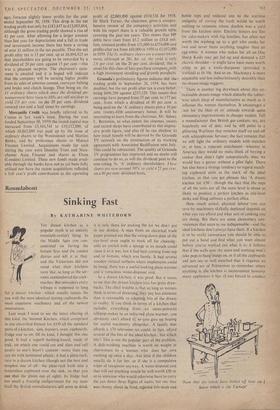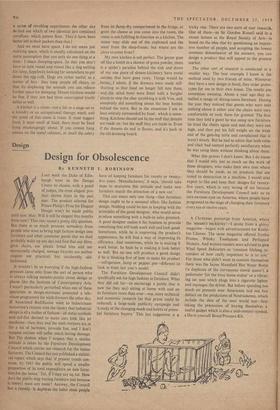Roundabout
Sinking Fast
By KATHARINE WHITEHORN
THE dream kitchen as a popular myth is an entirely twentieth-century thing. In the Middle Ages you con- , 4}P. centrated on having the Last, week I went to see the latest offering of this kind, the Summit Kitchen, which comprised in one electrified fitment for t450 all the standard parts of a. kitchen : sink, burners, oven, cupboards, fridge and so on. Of its kind, I thought this one good. It had a superb bashing-board, made of teak, on which one could cut and slam and roll Pastry to one's heart's content—more than you can do with laminated plastic; it had a plate-rack, rare in a dream kitchen (though not the best and simplest one of all : the plate-rack built into a bottomless cupboard over the sink, so that you can shut the plates out of sight). Its fridge had too small a freezing corApartment for my taste (hall' the British manufacturers still seem to think it is only there for making the ice we don't put in our drinks). A man from an electrical trade paper pointed out that.the swing-down door of the eye-level oven ought to hook off for cleaning : only an ostrich with a sponge in its mouth could clean it as it was. but it had heat coming from top and/or bottom, 55 Ilia was handy. It had several wooden vertical SUrfaCCS where implements could be hung; there was a uselul-looking plate-warmer and a voracious waste-disposal unit.
As a dream kitchen, it was good. But it seems to me that the dream kitchen idea has great draw- backs. The chief trouble is that so long as women think in terms of dreaming, they pay less attention than is reasonable to adapting bits of the dream to reality: If you think in terms of a kitchen that includes everything from an atom-powered lollipop-maker to an infra-red plate-warmer, you obviously can't afford it; so you give up hoping for useful machinery altogether. A family that affords a £70 television set could, in fact. afford several of the bits of the ideal kitchen : but which bits? This is not the popular part of the problem. A dish-washing machine is worth its weight in charwomen to a woman who does her own washing up once a day--but little if the children usually do it for her, or if she is a compulsive wiper of teaspoons anyway. A waste-disposal unit that will eat anything would be well worth £50 or so to someone who would otherwise have to carry the can down three flights of stairs; but one that was choosy about its food, rejected fish-skins and bottle tops and reduced one to the wartime indignity of sorting the trash would be worth nothing to someone whose dustbin was a yard from the kitchen door. Electric mixers are fine for cake-makers with big families, but often not worth the washing up to a girl who cooks for two and never beats anything tougher than an egg-white. A woman who stakes her all on One Sharp Knife may get fed up and demand a £25 electric shredder--it might have been more worth while to get a knife-sharpener (provided it Worked) at £6 10s. And so on. Machinery is more attainable and less indiscriminately desirable than the dream image suggests.
There is another big drawback about this un- realisable dream-image which disturbs the (other- 'wise total) sleep of manufacturers as much as it inflames the women themselves. It encourages a .'not for the likes of us' attitude towards quite elementary improvements in cheaper models. Tell a manufacturer that British gas cookers, say, are hopelessly out Of date, and he Will point to a glittering Wurlitzer that 'switches itself on and off with schizophrenic fervour; the fact remains that we still light the ordinary models with matches or, at best, a separate attachment—whereas in America they would no more think .f buying a cooker that didn't light automatically than we would buy a geyser without a pilot light. There has also been a strange tendency to regard match- ing cupboard units as the mark of the ideal kitchen, so that you get phrases like 'A dream kitchen for £58': though the fact that the tops of all the .units are all the same level is about as likely to produce a- perfect kitchen as one-level desks and filing cabinets a perfect office.
How much actual, physical labour you can save by machinery skilfully deployed depends on what you can afford and what sort of cooking you are doing. But there are some elementary con- veniences that seem to me indispensable—and the ideal kitchens don't always have them. If a .kitchen is to be really convenient you should be able to put out a hand and find what you want almost before you've worked out what it is; it follows that if the walls tear the stove and worktop won't take pegs to hang things on, or if all the cupboards and jars are so Well matched that it requires an advanced act of Pelmanism to remember where anything is, the kitchen is inconvenient however many appliances it has. (I was forced to conduct
'Now rititt the labels have boiled off how do I know which is the Turkey?' a series of revolting experiments the other day to find out which of two identical jars contained cornflour, which potato flour. They'd have been better left in their packets than that.) And we must have space. I do not mean just working space, which is usually calculated on the naive assumption that you only do one thing at a time: I mean dumping-space. So that you don't have to turn round and round like a dog settling for sleep, hopelessly looking for somewhere to put down the egg-yolk. Dogs are rather useful, as a matte • of fact : they keep people off chairs, so that by displacing the animals you can release further space for dumping. Dream kitchens would be fine, if they just had three unoccupied trestle tables as well.
A kitchen is a room—not a lab or a stage-set or a laundry or an occupational therapy ward; and the point of this room is FOOD. II must suggest food, it must smell of food, there must be food lying encouragingly about. If you cannot hang onion; on the metal cabinets, or smell the celery from its damp-dry compartment in the fridge, or greet the cheese as you come into the room, the room is not fulfilling its function as a kitchen. The mixer may slide out of the cupboard and the meat from the deep-freeze; but where are the ideas to come from?
My own kitchen is not perfect. The geyser goes off like a bomb in a shower of green powder, there is a spider's paradise behind the sink and doors of my one piece of dream-kitchenry have metal catches that have gone rusty. Things would be better, I admit, if the drawers were made self- shutting so that food no longer fell into them, and the salad bowl were fitted with a burglar alarm to stop the char scrubbing it with Vim, and somebody did something about the beer bottles behind the stove. But in the meantime I am at least entirely surrounded by food : which is some- thing. Kitchens should not be the stuff that dreams are made on; but the stuff they are made in. Even if the dreams do end in flames, and it's back to the old draining-board.



























 Previous page
Previous page